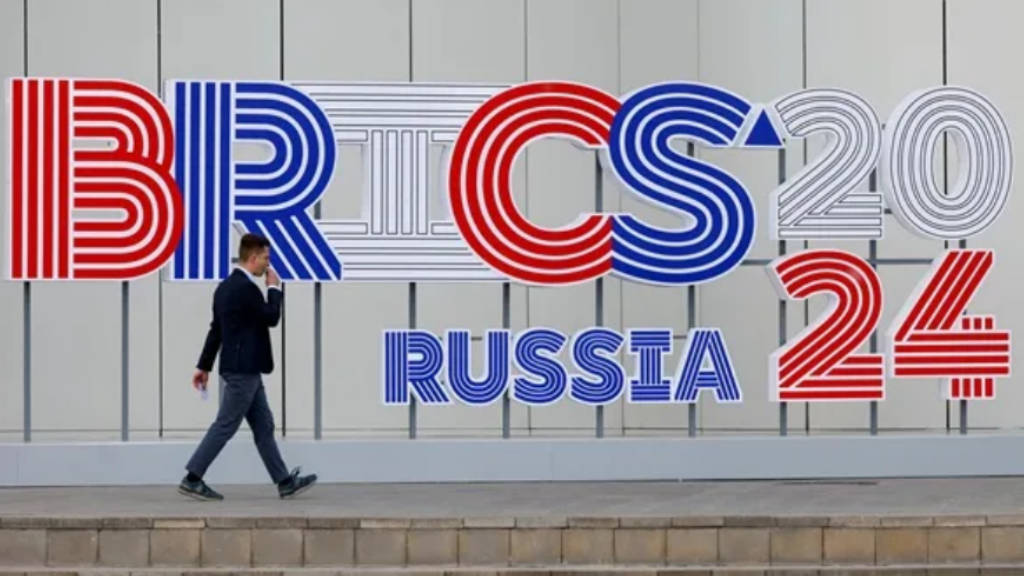The Belarusian Foreign Minister, Maksim Ryzhenkov has said that the BRICS group could add at least ten new members at the forthcoming annual meeting later this month.
Belarus is hoping to be among them, while Ryzhenkov stated that “The first wave of enlargement, as we all expect – those who have submitted such applications – will take place at the Kazan summit. Russia is formulating the list of these countries that will be in this wave of enlargement.”
The upcoming BRICS summit is to be held from October 22-24 and will see Russian President Putin joined by other heads of State, including China’s Xi Jinping, India’s Narendra Modi, Brazil’s Lula da Silva and South Africa’s Cyril Ramaphosa. Also attending will be Egypt’s Abdel Fattah El-Sisi, Iran’s Masoud Pezeshkian, Ethiopia’s Sahle-Work Zewde and the UAE’s Sheikh Mohamed bin Zayed bin Sultan Al Nahyan.
According to the European Parliament, these full BRICS members account for 37.3% of global GDP, compared with about 30% for the G7.
The 2024 New BRICS Membership Candidates
Earlier this month, Belarusian Deputy Foreign Minister Sergey Lukashevich said his country is a primary BRICS candidate, along with Algeria, Bangladesh, Bahrain, Bolivia, Venezuela, Vietnam, Cuba, Honduras, Indonesia, Kazakhstan, Kuwait, Morocco, Nigeria, Palestine, Saudi Arabia, Senegal, Thailand, and Turkiye.
The Turkish Speaker of Parliament, Numan Kurtulmus, stated just last week that he hoped that Turkiye’s membership would happen as soon as possible – a very major hint that this may be about to occur.
If so, Turkiye would send a strong message to the European Union that it has ultimately decided that its longer-term trade interests lie elsewhere. Turkiye has been an EU applicant since 1987. Turkiye’s membership of NATO may also be questioned, and certainly within Europe, whose current mentality would find it hard to reconcile Turkey’s membership of a group including Russia with European security.
According to Russian President Vladimir Putin, speaking at senior level BRICS meeting in September, 34 countries have applied to join BRICS. Apart from the countries the Belarusian Deputy Foreign Minister identified above, these also include Angola, Cameroon, the Central African Republic, Congo, the Democratic Republic of Congo, Equatorial Guinea, Ghana, Libya, Sudan, South Sudan, Tunisia, Uganda and Zimbabwe in Africa, Afghanistan, Azerbaijan, Iraq, Kuwait, Laos, Malaysia, Myanmar, Pakistan, Sri Lanka, Syria and Yemen in Asia, and Columbia, Ecuador, El Salvador, Nicaragua, Peru and Venezuela. Palestine has also made a request to join the group.
The Russian Foreign Minister, Sergey Lavrov, had stated earlier this year that BRICS may not add additional members until all members were satisfied with the economic and trade credentials of prospective members, believed to be at India’s request to slow expansion down and impose a stricter selection methodology. However, given the rapidly changing geopolitical situation, both Moscow and Beijing are believed to be in favour of a faster expansion rate.
Still, India’s point is valid, and may result in the announcement of a two tier structure, full BRICS membership and a ‘Friends of BRICS’ group which are recognised as later potential members. It should be noted that membership of BRICS usually comes with some fiscal contributions and responsibilities – taking an equity position in the BRICS New Development Bank for example. That may be too early a commitment for some of the candidate nations.
Nevertheless, the BRICS group does appear poised to launch a serious and significant challenge to the West as a collaborative group this month, with the potential for announcements concerning their continued use of the US dollar in trade, and an overall move away from the US-controlled SWIFT global financial settlements system. As the New York based Nasdaq stock exchange stated last month, if enough countries move away from US dollar use in their bilateral trade, it is likely to have serious consequences for the US dollar and euro in global trade.
A further expanded BRICS would also start to seriously change global supply chains and trade flows as member countries begin to enhance and prioritize intra-BRICS trade as opposed to the stricter, often regarded as unfair, regulatory requirements imposed on their trade rights by the United States and European Union.
For the latest intelligence about the BRICS, please see our BRICS-specific archives here.
Further Reading
BRICS “B20” Proposed As A Global Parliamentary Bloc As New Members Clamour To Join
Continue Reading





 Русский
Русский









